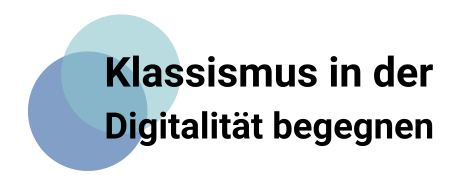The zQSL-funded (LeNA) project addresses classism from an intersectional perspective as a form of discrimination and exclusion in the education and university system. In addition to intra-university reproduction mechanisms of social inequality and classism, the special focus is on the analysis of classism and inequality relations in digitality. In addition to a habitus-sensitive and difference-reflective range of courses each semester, regular university-wide workshops and training courses on social inequality and classism, a lecture series on “Social Inequality, Class and Digitality” in the winter semester 25/26 and the student literature project “Narrating Origin” are held. This is a cooperation project between the Pädagogik in der Digitalität department and the “Praxislabor” department.
Duration: 01.01.2025 to 31.12.2026
Offer
The interlinked project elements have a self-empowering effect and support students in developing skills relevant to their studies. A space is created for problems relating to social background that arise during studies and are not addressed, thus contributing to the creation of equal opportunities.
The offers are intended to contribute to strengthening educational equality on four levels across all subjects:
Links & Downloads
Project description
People who have moved up the educational ladder often have to struggle more with challenges at university. However, the hurdles and exclusions they experience are often localized and individualized on a subjective level, while structural conditions remain largely unquestioned: The conflicts and problems associated with educational advancement are often “not recognized by students as socially conditioned, but rather attributed by them to their own failures and repressed from their consciousness and thus from the possibility of verbalization through language” (Haeberlin). Although this observation was made several decades ago, current empirical studies show that the mechanism of self-exclusion continues to operate and that the discrimination of students from non-academic backgrounds does not generally take the form of open exclusion, but that the reason for the feeling of exclusion lies primarily in the students' own insecurity in the face of the demands of the university structure. This diagnosis must currently also be discussed in the context of digitality. The cultural-theoretical concept of digitality differs from that of digitalization in that it does not propagate a general implementation and expansion of digital infrastructures, but rather discusses various mechanisms of action of digital infrastructures on socialities. Digitality is understood as the overarching structural principle that fundamentally shapes contemporary society and from which a number of challenges for society in general and education in particular are derived. This refers, for example, to the tendency towards quantification and optimization, towards standardization and increased performance, towards increasing uncertainties while at the same time excluding all those experiences that cannot or can only with difficulty be represented digitally. In the context of a society in digitality, however, we must also focus on those social transformation processes that lead to a digital divide in social space and also in higher education due to the dynamics of digitalization.
The project intends to
- To sensitize, promote and empower students of non-academic origin through educational offers and measures for mechanisms of inequality in general and in digitality in particular.
- To sensitize students of academic origin to classism (criticism) by recognizing and reflecting on their own privileges.
- To sensitize teachers and other interested parties to classism (critique) in the university context and to develop and strengthen attitudes in teaching that reflect classism (also with regard to the use of digital infrastructures).
- To highlight the significance of digitality for the reproduction of classism and social inequality, particularly in higher education.







